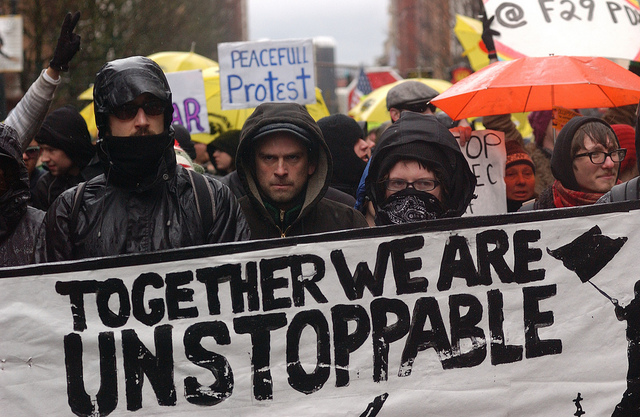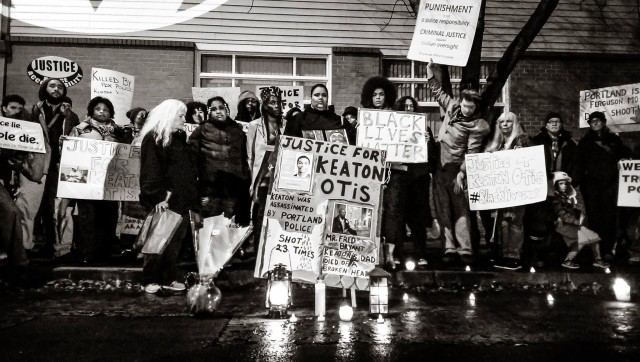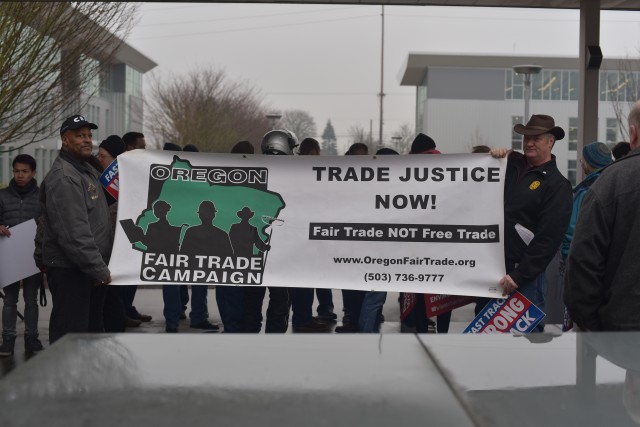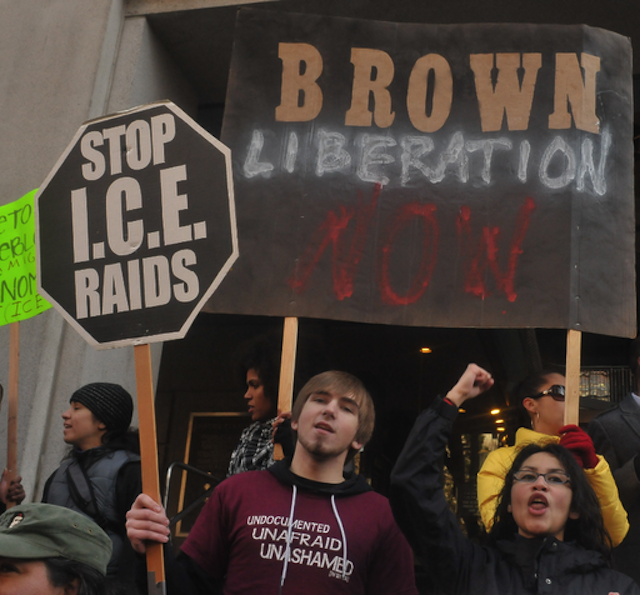
photo by Paul
Story by Pete Shaw
When the healthcare law debate was raging a few years back, there was a rally at which people were urging Senator Ron Wyden to support the “public option,” something that perhaps would have more rapidly led to single payer health insurance system. If memory serves, the precise point of the rally was that Wyden was receiving a lot of money from Blue Cross/Regence, and people were asking the age old question of their putative representative: who do you serve?
Near the end of the rally, one woman raised her hand and asked, “Why don’t we have a general strike?” The request seemed to leap right out of Monty Python’s Life of Brian when the People’s Front of Judea makes its plan to kidnap Pontius Pilate’s wife and threaten to kill her if Pilate does not dismantle the entire Roman apparatus within 72 hours. We’ll just make a few phone calls, send out some emails, and by the end of the week we will have the capitalists on their knees, offering us anything we want along with pudding and pie.
While the impulse behind the woman’s idea was correct, the amount of work that must go into a general strike–one where a substantial number of workers do not show up for work and refuse to work until their demands are met–is more than can be done in a few days, maybe even a few years. The amount of organization required is immense and requires a level of coordination that is very difficult to achieve.
As I type, a bunch of white supremacists (the corporate media now calls them militias or patriot groups, probably because many find the term “white supremacist” to be cognitively dissonant when used to describe someone toting a US flag) from various groups with some kind of nationalistic name that appeals to mom, the US flag, and apple pie have taken over the ranger station at the Malheur Wildlife Refuge in Harney County, in southeast Oregon. They are making some claim that their sovereignty, liberty, and freedom is being trod upon by the US government.
The irony, perhaps willful, but more likely born out of ignorance, is extreme. Those white supremacists would not even be there save for the fact that their government had at one time violently taken Malheur from a native tribe–the Paiute. Furthermore, some of these white supremacists are ranching sorts who are leasing land from the government they hate at incredibly cheap rates. According to the Western Watersheds Project “the current public land grazing fee of $1.35 per month for one cow and her calf is woefully below market value. Direct government expenditures to administer public land grazing constitute an annual net loss to the taxpayers of at least $123 million and more than $500 million when indirect costs are accounted for.”

Photo by Benji Bảo Vương
The Malheur gang has become the butt of many jokes and fan fiction. Consider, for example, the hilarity to be mined from the fact that they apparently forgot food and had to put out a call for snacks. This is not to imply that these people should not be taken seriously, because anyone with a gun–especially one openly espousing white supremacy–should be taken very seriously. What interests me, however, is their organization. It is very poor. The only thing going for it is, to borrow a phrase, the fact that it’s backed with the full faith and credit of the United States government. For all the jokes at their expense, these Malheur malcontents are part and parcel of a guiding ethos which could never imagine this country belonging to anyone but white people. The rhetoric of these groups, however, can be a little too close to the bone for most people. Institutional racism–with the occasional coded language–is the preferred approach; the soft pedal that plays the same notes, but covers up the extreme harmonics.
Many people are making the comparison between the white supremacists and the Black Lives Matter movement, noting in particular that if this takeover had been perpetrated by Black Lives Matter the police would have quickly–and probably violently–responded. Certainly there is enough history to prove that police force at any level is applied significantly more harshly to non-whites than to whites, but here, I think, is a better and more positive comparison. What is going on in Malheur should remind us of the difference between a slapdash call to arms and the real, hard work of meaningful organizing–the organizing that subverts the capitalist system which ultimately supports white supremacy, though prefers its display be less overt.
Those organizing against the system–who do not have the implicit backing of the power structure–must by necessity create alternative structures far more resilient than white supremacist groups. The Black Lives Matter movement did not fall out of the ether. Black people have been organizing for justice in the United States since the ink dried on the Declaration of Independence. What Walidah Imarisha says in her Why Aren’t There More Black People in Oregon? program–that it is truly amazing that a Black community exists in Portland–could reasonably be applied to the country as a whole. The Black Lives Matter movement exists along this continuum of organizing not just for justice, but also for survival in a country that has never welcomed Black people as people.
As 2016 begins, even as police continue murdering Black people, large numbers of people are questioning police actions and even the legitimacy of police. Some police are being indicted for crimes where for many years that seemed somewhere between extremely unlikely and impossible. In short, the Black Lives Matter movement is making a difference that is starting to shake the system.

Photo by Pete Shaw
In other fights, there is a similar dynamic. For about 5 years now, the Trans-Pacific Partnership has been delayed, and there is a reasonable chance that it will not be passed in the US. In 2010 I attended a rally at Pioneer Square, led by the Oregon Fair Trade Campaign. About 10 people attended. Through constant agitation and education, the crowds have swelled and again what once seemed impossible borders on real.
The immigrant rights and justice movement, which came to the forefront of many people’s consciousness on May Day, 2006, has certainly made great gains under extremely oppressive conditions including the threat–and reality–of detention and deportation. It now faces another challenge since it has been announced that the Immigration and Customs Enforcement Agency will be ramping up its raids. This will not be an easy fight, but it will be easier because of the groundwork so many people have laid, gaining solidarity with other groups engaged in the same battle against the ruling class.
And I would be remiss if I did not mention the 23 year effort of the Rural Organizing Project (ROP) which has helped organize a grassroots movement of human dignity groups that “challenges the anti-democratic right.” ROP has condemned “the armed occupation of the Malheur National Wildlife Refuge as a political stunt.” As it has for so long, the ROP is seeking real solutions to real problems–problems that cannot be solved with inflammatory rhetoric and guns. As it notes on its website, these white supremacists are distracting people from “the real and pressing economic crisis that the residents of Harney County and much of rural Oregon face. Jobs have disappeared and no new economic engine has replaced the old economics based on natural resources. Public services like schools, libraries, public safety, and public transportation have been defunded for years, leaving communities without basic services…We need to focus on meaningful investment in rebuilding public infrastructure so that the residents of Harney County have the support they need on a day-to-day basis.”

Photo by Pete Shaw
None of these groups could do what the white supremacists in Malheur have done: To pack up some high powered weaponry and go lay siege to Federal land is unthinkable–suicidal even. But white supremacists are getting away with it because, despite their rhetoric, they are not actually threatening the power structure in this country. Were they part of a movement trying to wrest power, wealth, and privilege from the hands of those who who control them and put them into the hands of the proverbial 99%–that is, if they stood in opposition to white supremacy and the capitalist system which manifests it–Malheur would look a lot more like Wounded Knee, the road between Selma and Montgomery, or the tent colony at Ludlow.
As the new year gets under way, take some time to register the very real gains that have been made, and then continue working for greater ones. Every so often those small gains coalesce and from them comes something huge that to those not involved seems to come from nowhere. Heck, for many of those involved it comes as a surprise.
My friend Ahjamu Umi of the All-African People’s Revolutionary Party always urges people to get involved in a group fighting for justice. In truth, if you choose to heed his words, your problem will be choosing just one.






